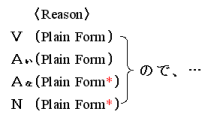“~ので、~”与本课句型9-1的“それで”不同,它叙述句中的理由。
な形容词和名词的现在肯定形是把其基本形去掉“だ”换成“な”。

![]() 兄は びょうきに なったので、学校を 休みました。
兄は びょうきに なったので、学校を 休みました。
哥哥因为得了病,所以没有去学校。

![]() この テープは だいぶ 古いので、いい 音が しません。
この テープは だいぶ 古いので、いい 音が しません。
因为这个磁带很旧,所以声音不好。

![]() 図書室は しずかなので、よく べんきょうが できます。
図書室は しずかなので、よく べんきょうが できます。
因为图书室很静,所以能好好学习。
Lesson 10-7「よく わかりませんから、もういちど 先生に ききましょう。」
因为不太明白,所以再问一次老师吧。
|
【~ので、それで】【~から、だから】
ので and それで are often followed by a fact or a phenomenon consequent to a
preceding event. They are rarely used with sentences which has the following endings: ×~でしょう (conjecture ; probably~) ×~ましょう (proposal, suggestion ; Lets'~) ×~なさい(imperative ; e.g., Do it.) ×~てください(request ; Please~) etc. On the other hand, から and だから are often used with the above sentence endings. |

